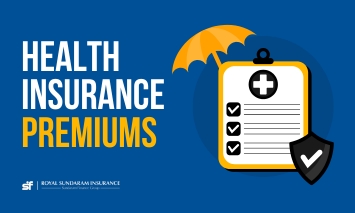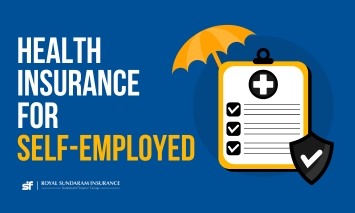Health Insurance for Self-Employed: A Road Map to Good Health
Mar 24, 2025 • 3 Min Read

Health insurance is an important part of everyone's life, providing financial security and acting as a gateway to quality healthcare services. Ensuring well-being and peace of mind in a dynamic job environment holds a unique significance, especially for self-employed individuals. Whether you're a freelancer, entrepreneur or small business owner, you must get yourself health insurance and enjoy a shield against unexpected medical expenses.
Read our guide to understand the benefits, features and steps involved in health insurance for self-employed and make informed decisions.
Benefits
Medical insurance for self-employed people offers numerous benefits. It will help to take care of your well-being without the fear of medical expenses. Here are some of the key advantages of health insurance -
- Financial Protection: In unexpected emergencies, health insurance acts as a safety net. It lowers the burden of medical expenses and reduces the risk of a financial crisis. Insurance covers expenses like hospitalisation, surgeries, medications and other medical treatments.
- Access to Quality Healthcare: Health insurance ensures good quality healthcare service. It includes established networks of healthcare providers, such as doctors, specialists, hospitals and clinics. Insurance also offers timely and appropriate medical service at an affordable price.
- Preventive Care Services: Preventive care services are an essential component of the best health insurance for self-employed individuals. It covers services such as annual check-ups, screenings, vaccinations and wellness programs. This is needed to maintain good health and detect potential health issues in the early stage.
- Peace of Mind: Knowing that you are covered by health insurance provides financial security and peace of mind. This helps working professionals focus on growing their business and pursue their passions without worrying about unexpected medical expenses.
Features
- Self-employed individuals often get flexibility in coverage options to find a plan that best suits their needs and budget. This includes coverage for medical services, prescription drugs, hospitalisation, and more.
- You can customise your health insurance premium based on coverage levels, deductibles, co-payments and coinsurance. This is needed to find a balance between affordability and comprehensive coverage.
- Health insurance plans provide access to a network of healthcare providers. From doctors to specialists to hospitals and clinics, you can choose a provider you trust.
- Health insurance for self-employed individuals is portable, and you can easily continue it even if you change jobs or start a new business. This guarantees that you do not lose the benefits due to changes in employment status.
- Health insurance providers offer online tools and resources specifically designed for self-employed individuals. These include online enrollment, billing management, claims tracking, etc., to save their time and effort.
How do you get health insurance for the self-employed?

Getting health insurance for self-employed individuals involves several steps. Here's how to get it right:
- Assess Your Needs: Determine your healthcare needs and priorities by considering your budget, coverage required, pre-existing conditions and preference service providers.
- Research: Look for different health insurance companies and compare their plans, insurance options, premiums, provider networks, etc. It's advisable to check multiple plans from different providers to find the best options for your needs.Royal Sundaram provides affordable health insurance for self-employed individuals. Check out other plans and secure your life with excellent coverage.
- Obtain Quotes: Once you have a list of preferred plans, get quotes from potential providers. Compare the premiums, deductibles, co-payments, etc., to get the best value.
- Understand the Terms: Before you pick one, read the terms and conditions of the plan carefully. Pay extra attention to exclusions, limitations, and coverage details. Also, learn about the advantages, how to use the service, and how to make a claim.
- Enroll in a Plan: Once you find a plan that fits your needs and budget, move ahead with the enrolment process. Fill out an application form and pay the first premium.
- Pay Premium: Make sure to pay your insurance premiums on time to ensure that your coverage remains active.
- Review Annually: Renew your insurance coverage every year to ensure that it still meets your needs. Update the information about health, finances, or lifestyle as needed.
Conclusion
Navigate the world of health insurance and manage both your business and well-being effectively. By reading this guide, you can make informed decisions that provide you with the coverage you need at a price you can afford. Remember, investing in your health is an investment for the future and longevity.
So, take charge of your health insurance journey today and pave the way for a secure future.



Discover the perfect insurance plan for you!
Get your free quote now!
Get StartedBy Clicking on Get Started, You agree to our Terms and Conditions and override DNC/NDNC registration.
More like this
View more





